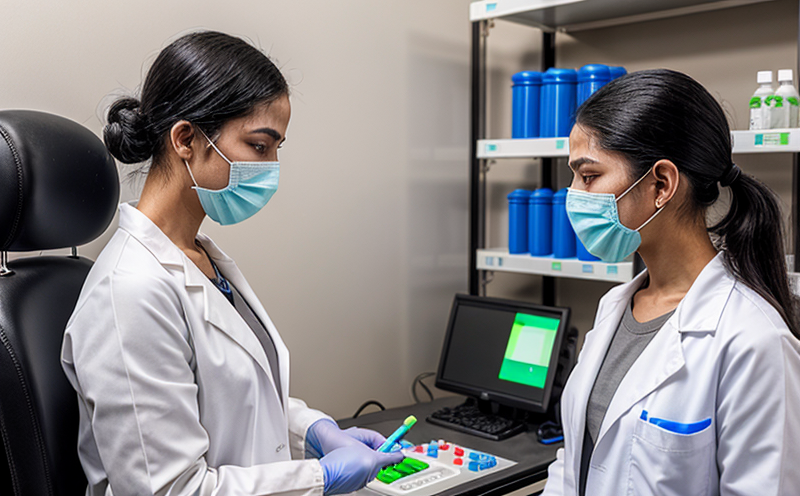Mutagenicity Forward Mutation Assay Testing
The Mutagenicity Forward Mutation Assay (FMA) is a pivotal tool in pharmaceutical testing, particularly for assessing the genotoxic potential of new drug candidates. This assay evaluates whether a substance can induce mutations in the genetic material of cells through direct interaction with DNA or by other means. Ensuring that drugs are non-mutagenic is crucial to prevent adverse effects on human health and compliance with stringent regulatory requirements.
The FMA involves several key steps: selection of appropriate strains, preparation of test samples, inoculation into the assay medium, incubation, and finally scoring for mutations. The process typically uses bacterial or mammalian cells that can be easily transformed to allow for the detection of point mutations in specific genes known to be sensitive indicators of mutagenicity.
One of the most widely recognized methods is the Ames test, which is based on the FMA concept and utilizes Salmonella typhimurium strains deficient in certain histidine biosynthetic genes. The test measures the ability of compounds to induce revertant mutations by supplying a single-nucleotide base change that restores histidine synthesis.
The importance of this testing cannot be overstated, as it directly impacts patient safety and regulatory approval processes. Regulatory bodies such as the U.S. Food and Drug Administration (FDA), European Medicines Agency (EMA), and World Health Organization (WHO) mandate genotoxicity testing to ensure that pharmaceuticals do not introduce unintended mutations in patients.
Our laboratory uses advanced instrumentation and protocols compliant with international standards, including ISO 10993-27, to conduct these tests. We follow rigorous quality control measures and adhere strictly to Good Laboratory Practices (GLP) and Good Clinical Practices (GCP).
Why It Matters
The significance of mutagenicity testing in pharmaceutical development cannot be overstated. Mutagenic compounds can lead to serious health risks, including cancer and genetic disorders. By identifying potential mutagens early in the drug discovery process, companies can avoid costly delays and ensure product safety.
From a regulatory perspective, non-compliance with genotoxicity testing requirements can result in significant penalties and withdrawal of products from the market. Ensuring that pharmaceuticals are safe for human use is paramount to maintaining public trust and compliance with international standards like ISO 10993-27.
The Mutagenicity FMA is not just about compliance; it also plays a crucial role in advancing scientific understanding of how drugs interact with biological systems. This knowledge helps researchers design safer, more effective medicines while minimizing risks to public health.
Competitive Advantage and Market Impact
- Innovation Leadership: By providing cutting-edge genotoxicity testing, our laboratory remains at the forefront of pharmaceutical research.
- Rigorous Compliance: Our adherence to international standards ensures that clients meet regulatory requirements and gain a competitive edge in the global market.
- Customer Satisfaction: Timely delivery of accurate results fosters long-term relationships with our clients, enhancing overall customer satisfaction.
- Market Recognition: Reputation for delivering high-quality services enhances our standing within the industry, attracting more business and partnerships.
Use Cases and Application Examples
| Application Case | Description |
|---|---|
| New Drug Candidate Evaluation | Identify potential mutagenic compounds early in the drug development process to avoid costly delays. |
| Cosmetics and Personal Care Products | Evaluate ingredients for safety, ensuring compliance with regulatory requirements. |
| Agricultural Chemicals | Assess potential environmental impacts by identifying compounds that could affect soil and water quality. |
| Environmental Testing | Detect pollution sources in water or air to prevent long-term health effects on local populations. |
| Application Case | Description |
|---|---|
| Bioavailability Studies | Evaluate how the body absorbs and processes a substance to ensure efficient drug delivery. |
| Pesticide Residue Analysis | Determine safe levels of pesticide residues in food products to protect consumers from harmful exposure. |
| Pharmaceutical Excipient Testing | Ensure that excipients used in formulation do not introduce mutagenic compounds into the final product. |
| Biodegradability Assays | Evaluate how quickly and completely a substance breaks down under natural conditions to minimize environmental impact. |





